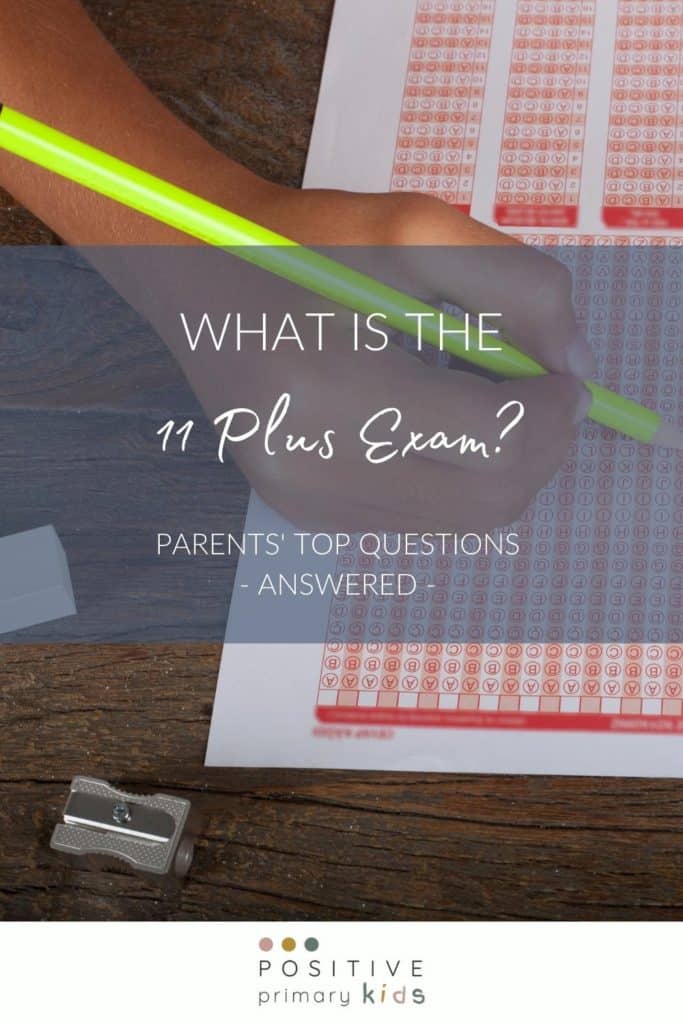Is your child is currently in year 5 of primary school? If so, it’s likely that you’ve started thinking about their secondary school options. If grammar school is something that you are considering, this article will help answer your questions about how to prepare and what to expect in the lead up to the 11 Plus exam.
Affiliate Disclosure: This post may contain affiliate links. This means that I may receive a small commision – at no cost to you – if you make a purchase through these links. Thank you for your support!
What is the 11 Plus Exam?
The 11 Plus (also known as 11+, eleven-plus or entrance exams) is a test used by grammar schools to select the most academically-able pupils. Some private schools also administer the 11 Plus. Unlike private schools, you do not pay to go to grammar school because they are state-funded.
Until the 1970s, all children in England and Wales sat the 11 Plus in their final year of primary school. Since then, the majority of grammar schools have been abolished and turned into comprehensive or private schools. Although grammar schools are still very popular in some areas of England, such as Kent, Lincolnshire and Essex, many counties no longer have any.
What Does the 11 Plus Consist of?
Subjects
There are four main subject areas that can be in the tests. These are:
- Maths
- English
- Verbal Reasoning
- Non-Verbal Reasoning
I’ve written an ‘at-a-glance’ guide to 11 plus subjects if you want to find out more.
Formats and Exam Boards
Individual schools are free to set their admission policies and choose which subjects to test. Some set exams for all four of the subjects above, whilst others may select a couple to examine. In addition to the exam, some ‘super-selective’ schools also require children to attend an interview.
There are two main exam boards that grammar schools use.
- GL Assessment (previously NFER) covers English, Maths, Verbal and Non-Verbal Reasoning.
- CEM (Cambridge Assessment Centre for Evaluation and Monitoring) covers Verbal, Non-Verbal and Numerical Reasoning.
UPDATE
Since September 2023, CEM stopped providing paper-based exams, and although some schools opted to switch to their online exam service, GL has become the main provider of 11+ exams.
There are significant differences between what each board’s exams consist of and questions have been raised about the fairness of CEM tests, which are designed to be ‘unpreparable’. Again, that is a topic for a future article!
The format and length of exams by these two boards is another aspect that varies depending on the region. Generally speaking:
- GL exams are either multiple-choice and answers are marked on a separate page, or standard format where answers are written next to the question. Each subject is examined with a separate paper lasting around 45-50 minutes each.
- CEM exam papers have combined subjects. Questions can be multiple-choice, standard format or a combination. The format and timings vary and are unpredictable. For example, previously there has been:
- One paper covering English and Verbal Reasoning and another with Maths and Non-Verbal reasoning questions.
- One paper combining everything.
- Four separate papers.

How Difficult is the 11 Plus?
Competition for grammar school places is very high so schools are able to select children with the highest marks. In theory, the contents of the exams are based on the National Curriculum up to the end of year 6. This poses a problem – exams usually take place at the beginning of year 6, so they may contain questions on topics that children haven’t yet encountered. On top of this, Verbal Reasoning and Non-Verbal Reasoning aren’t part of the primary curriculum so state primary schools don’t teach these subjects. This gives children from private primary schools an advantage because they are often taught these two subjects.
Without structured, thorough and regular practice and preparation in the time leading up to exams getting a good exam mark can be very difficult.
Children must be motivated to get into grammar school and willing to put in a considerable amount of effort outside of school to prepare for the exams.
What is the Pass Mark and Pass Rate for the 11 Plus?
There isn’t a ‘fixed’ pass mark for these exams. It varies between regions and depends on how many spaces and applicants there are. Very approximately, marks of 80% and over would be typical for a pass.
However, achieving that pass mark doesn’t guarantee a place – especially if more children achieve or exceed it than there are available places. I’ve struggled to find actual pass rate data – if you find some, please let me know!
How Do I Know If My Child Should Sit The 11 Plus?
Grammar school is not the right fit for all children. It is a very academic environment with high expectations and that all comes with high pressure. Many children absolutely thrive academically and socially at their local comprehensive school.
If your child is currently in year 4 or 5 and regularly ‘exceeds expectations’ in Maths and English at school, then they may be suitable. They need to be motivated and resilient to cope in a competitive and highly academic environment.
Can You Re-sit the 11 Plus Exam?
Children only get one chance to take the 11 plus for the school/s you are interested in applying for. The exception to this would be if you are applying to schools in different areas. If you feel that their mark has been given unfairly, it is possible that you could appeal that decision.
If you have your heart set on grammar school, some do offer 12+ or 13+ exams for entry into years 8 and 9.
How and When Do I Prepare for the 11 Plus Exam?
The first step you should take is to find out about grammar schools in your area. You need to know the following:
- Which subjects are in their exams (Maths, English, Verbal-Reasoning, Non-Verbal Reasoning)?
- Which exam board do they use (GL, CEM or their own)?
- What format are the exams (multiple-choice, standard answer or a combination)?
- When will exams be held?
Here’s a handy list of grammar schools in England arranged by region. Each school has links to their own websites too so you can start your research.
Once you know these key details, you can start the process of planning and preparing your child for the exams. This process will depend very much on your child’s individual needs and it can be quite overwhelming. At this point, you may want to consider whether to hire a tutor or take on the preparation yourself. A study by University College London’s Institute of Education found that around 70% of tutored children got into grammar school, compared to only 14% of children who did not have tuition.
Many parents choose to start several years before the exam – don’t be put off by this or think you should be doing it too. I would strongly advise against that! If grammar school is a suitable environment for them, they shouldn’t need to do such an excessive amount of work when they could be playing and enjoying being a child. If a child needs such intensive preparation for the entrance exams, they are likely to struggle once they are in their new school.
On the other hand, don’t leave it too late! In most cases, 12-18 months is a sensible timeframe to thoroughly prepare without getting overwhelmed and burnt-out.
As for exactly how to prepare, that is a big question and it is beyond the scope of this article. I am working on a series of helpful articles that will break down exactly how to prepare for each subject. Keep an eye out for those in the near future.
Wrapping up…
I hope that you have found this helpful if you are considering grammar school for your child and you know what your next steps will be?
Do you have further questions about the 11 Plus exams? Please let me know in the comments below and I will endeavour to answer them for you!






0 Comments